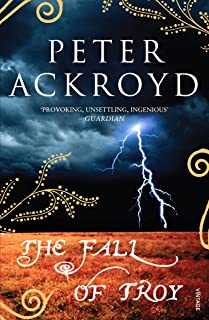In The Fall Of Troy, Peter Ackroyd explores some grand themes against a backdrop of a grander history, but always from the narrowed view of an obsession that denies experience.
The story is set in the early twentieth century, a period of great and fast discovery of ancient sites. It is also a time when archaeology is being transformed from a pastime of those with time on their hands to a science for professionals.
Obermann has his mission, an overbearing, all-consuming obsession that drives him to uncover ancient Troy. He knows where to look. In defiance of received wisdom, he demonstrates the accuracy and veracity of his assertions.
He feels things to be correct, admits no question and seeks to edit all dissent from any discussion. Enthusiasm feeds obsession, while obsession drives the man, excluding others. He has a track history of success, however, so when he pontificates about the whereabouts of the lost city, others tend to listen, despite his ideas appearing at best off-beat.
Obermann has taken a new wife, a young and attractive Greek woman called Sophia. She reads ancient Greek, so she can recite Homer to her new husband in the hours that cannot be devoted either to practical archaeology, of which we learn much, or marital duties, of which we learn nothing. She becomes a member of his team, entrusted if not actively enlightened, and soon learns how certain discoveries of her husband need to be sanitised to protect them from the gaze of their resident Turkish official, who is burdened with the task of inspecting all finds. She learns, also, how not to question the wisdom of her husband, a wisdom apparently founded in myth, expressed via whim and summing to obsession, but which is invariably correct. Until, that is, visitors appear.
There is a Harvard academic called Brand and an English vicar. Then there is Thornton from The British Museum. These visitors join Obermann and his wife, alongside a self-confessed Frenchman and a young man the boss calls Telemachus, who helps, but whose motivation remains suitably opaque.
But Obermann always dominates. Sophia becomes a new Helen of Troy while her husband’s assumptions are elevated to a religion he must live or be punished by.
As the dig progresses, finds appear, are sometimes revealed, sometimes not, and are interpreted, discussed, even fought over. If the resulting ideas conform to Obermann’s assumptions, harmony is publicly maintained. But if contradicted, the archaeologist appears to have the power to conjure divine retribution upon his critics. He is a man of the gods.
But eventually he is revealed as a man of the world. Sophia, the new wife, discovers a reality she never expected. She acts decisively when things come to a head but, as far as Obermann is concerned, it is the gods, perhaps, who play the last card.
View this book on amazon
The Fall of Troy

No comments:
Post a Comment
Please do keep comments relevant to the post